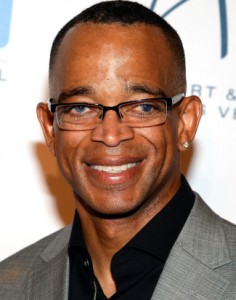
He was the first TV anchor to make hip-hop language and swagger part of the sports lexicon, and he made sure that disenfranchised black kids were represented at his table.
That a home run ball leaving the park wasn’t “hi-yoooo!” it was “boo-yahhhh!” And you got the difference for us, the kids from broken homes with cousins named Pookie, who wrote out rap lyrics in our notebooks and signed our names in bubble letters.
You didn’t patronize us free-lunch kids, you asked that we be included in the conversation. You slid our language right next to theirs and let it be. You included the music of your people and the experiences of your life to add to your depth. And your vast knowledge of hip-hop did not embarrass you. You were proud of it. You took the bullet for the rest of us; spoke our speech on-air so that even a throwaway phrase like “Yo” became commonplace.
“You had white guys, in their 30s, all with catchphrases,” ESPN host Dan Patrick said of Stuart Scott. “Stuart certainly wasn’t that.”
Nope. He was ours first—with the baggy-pants suits and tight fades that he wore early in his career—and in turn he became everyone else’s. This is the cornerstone of the legacy of Stuart Scott, a man who battled cancer three times with an authentic gangster mentality that most rappers only spit on wax.
According to his doctors, he refused to know what stage his cancer was in because he didn’t want to be defined by his illness. He chose to live on his terms, and that included rigorous chemotherapy treatments and ended with grueling mixed martial arts training.
Weeks before he would accept the ESPYs’ Jimmy V Perseverance Award, Scott spent days in the hospital undergoing multiple surgeries, but he was there, on the ESPY stage in Los Angeles, because he wasn’t going to let cancer hold him back. He was thin and war-torn, but not down.
“When you die, it does not mean that you lose to cancer,” he told the crowd. “You beat cancer by how you live, why you live and the manner in which you live.”
This is the true spirit of hip-hop and one that Scott embodied all the way to the end—for us. That although the odds are against you, it doesn’t mean that you can’t live to the fullest, out loud.
Or, as Notorious B.I.G. spit, “Remember Rappin Duke? Duh-ha, duh-ha. You never thought that hip-hop would take it this far.”
Stephen A. Crockett Jr. is associate editor of news at The Root. Follow him on Twitter.








